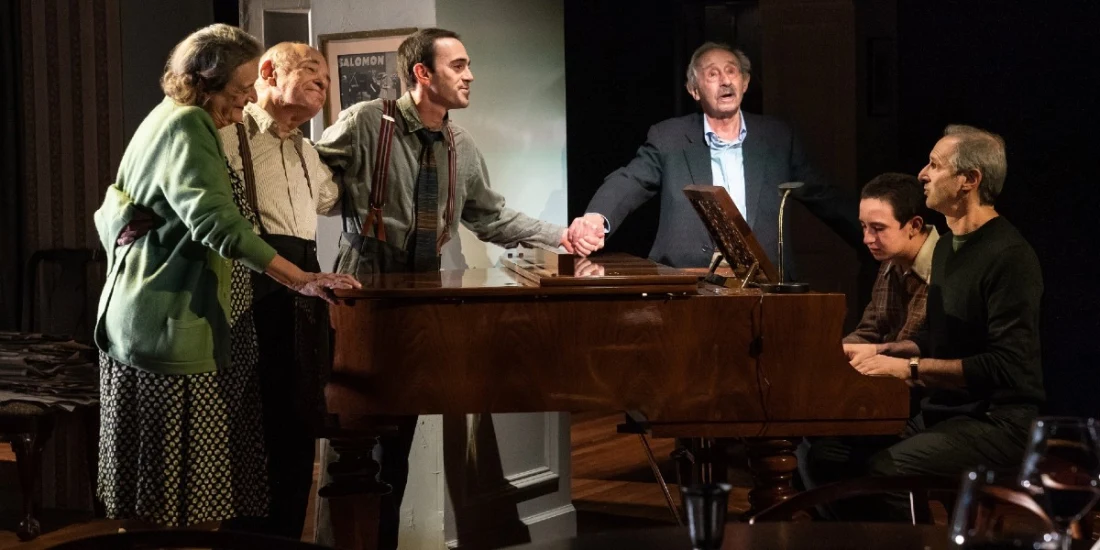'Prayer for the French Republic' review — standing tall under the weight of history
Prayer for the French Republic is an ambitious new play, currently running off Broadway at New York City Center with Manhattan Theatre Club, that clocks in at a jaw-dropping three hours. And the most amazing thing about it? Those three hours just fly by.
Joshua Harmon remarkably explores a century in the life of one Jewish family while folding in 1,000 years of Jewish history. And in a dramatic feat, the play does not collapse under its own weight. Instead, Prayer for the French Republic is a breathtaking work that skillfully balances the humanity of its characters with sprawling history.
Prayer for the French Republic goes back and forth in time. In the modern day, a Jewish family living in Paris is reeling when their son Daniel (Yair Ben-Dor) is the victim of a hate crime. This, combined with the increase in anti-Semitic hate crimes in Western Europe and the United States, leads the Benhamou family to debate moving to Israel. The play alternates between scenes set before and after World War II, as the teenage Pierre Salomon (Peyton Lusk) and his father (Ari Brand) try to rebuild their lives after being liberated from concentration camps. (If you are confused about how the characters are related, the program provides a handy guide.)
David Cromer keeps Prayer for the French Republic moving briskly. Cromer sets the action on a turntable (designed by Takeshi Kata) which, in turning back and forth, smartly tells the audience which way we're going in time. The constant motion could have dwarfed the play, but Cromer and his team keep the setting filled enough to denote a sense of place, but spare enough so you focus on the characters' words.
And they're saying a lot. Blistering dialogue, monologues, and direct audience addresses abound. In the program, Harmon talks about how he wanted to capture the diversity of voices in the Jewish diaspora: Some believe the state of Israel is necessary, some are critical of it, some believe that assimilation is the key to safety, and some think running away is necessary.
The 11-member ensemble cast makes the characters feel human, instead of like talking heads, as they take on different sides of these arguments.
Betsy Aidem is particularly moving as Marcelle, who is blindsided when her husband Charles (Jeff Seymour) wants to move their family to Israel. Her decision hinges the play, and Aidem has a wide palette to play with: hysterical to circumspect, sarcastic to loving. When she nags her family, you also feel the love and worry behind her actions.
Then there is Elodie, played by a fiery Francis Benhamou in a standout performance. Elodie lives with her parents and is suffering from depression. And Benhamou shows vulnerability in her posture and eyes, bringing dimension to this disgruntled, jaded millennial.
Elodie delivers the most challenging portion of the play: a multi-page monologue about being a Jew in Europe versus in America. It could have been an alienating tirade under less skilled hands, but the audience at my performance were hanging on Benhamou's every word, mummering in affirmation, some with finger snaps.
The play does become didactic at points, with the characters speaking at each other rather than to each other, and the historical context sometimes disrupts the emotional momentum.
Yet Prayer for the French Republic excels in the details, which ground the characters. When Daniel comes home bleeding, Marcelle tells him to sit down, except, "Not on the sofa, you're all bloody." Or when Pierre comes home after the Holocaust, the first thing he wants is a croissant. This attention to the minutiae of humanity, coupled with the sprawl of the story, is what makes Prayer for the French Republic such a richly dense and emotionally engaging piece of drama.
In Prayer for the French Republic, the weight of history isn't a burden. It is the answer. Through it, we better understand how to make sense of our chaotic, frightening, divisive world. And we learn more about ourselves and how to move forward, hopefully better this time.
Photo credit: Nancy Robinette, Kenneth Tigar, Ari Brand, Pierre Epstein, Peyton Lusk, and Richard Topol in Prayer for the French Republic. (Photo by Matthew Murphy)
Originally published on
